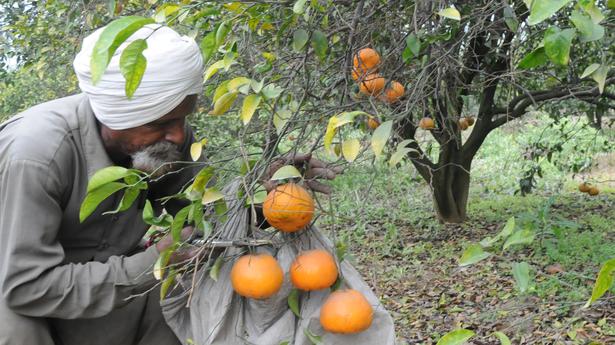
Prepare to pay more for kinnows in this winter
The Hindu
Decreased production, caused by an early summer and contaminated water, the reason for price rise
Prepare to pay more for the sweet and juicy kinnows during this winter. The production of the citrus fruit, a hybrid between King (Citrus Nobilis) and Willo Leaf (Citrus Deliciosa) mandarins, is likely to witness a drop of about 50% due to multiple issues, including the early summer that hit Punjab in March.
Fazilka is known for the best quality kinnow. The fruit is grown in about 2.5 lakh acres in the district. Trees and orchards of about 50,000 acres are estimated as perished in the district alone. “The trees and orchards have dried up in this area. The reason is polluted canal water. Groundwater cannot be used for kinnow. Canal water is polluted with chemicals from factories. We are facing issue for the last four-five years. When water is released to canals in April, it is getting mixed up with polluted water. Such a major loss is for the first time,” said Rajinder Singh Sekhon, who has thrice won the best kinnow farmer award by the State and Punjab Agriculture University authorities.
In the 13 acres of kinnow under his care, Mr. Sekhon lost the trees in about six acres. “Earlier, the production was about 2,000 quintals from 13 acres. This time, I am expecting just 400 quintals. The harvest will begin in December and continue till March. My expense for one acre is about ₹25,000,” he said.
The farmers are expecting a production loss of about 75%. While the fruit fetched the farmers ₹10-15 a kilogram so far, they have been offered ₹30-35 per kg now. However, this may still not help recover the expenses, said Mr. Sekhon.
H.S. Rattanpal, head of the Department of Fruit Science, Punjab Agriculture University, said there are two reasons for the decrease. “The early summer and increase in temperature in March resulted in fruits and flower shedding. Secondly, in areas like Fazilka, canals broke, creating water stress and water logging. Contamination is not a major factor. The production will definitely decrease but the farmers are likely to get better price this year. We expect 40 to 50% decrease in production. As a result, consumers may have to pay more for kinnow this time,” Dr. Rattanpal said, adding that the decrease in production could be higher in Southern Punjab.
Bharatiya Kisan Union ( Ekta Ugrahan) Fazilka district president Gurbhej Rohiwala said water scarcity and polluted water destroyed many orchards.
“Our estimate is that the district will see a decrease of 35% in kinnow production. We have demanded a solution for the polluted water and for compensation for farmers. Small farmers, who have land holding below five acres, suffered the most. They used to grow cotton along with kinnow. Both the crops faced damage due to early summer. They are in debt now. It takes at least six to seven years to set up an orchard. Now, farmers will have to remove dried up plants and find new plants in that place. No other crop can be grown in kinnow orchards,” Mr. Rohiwala said.











